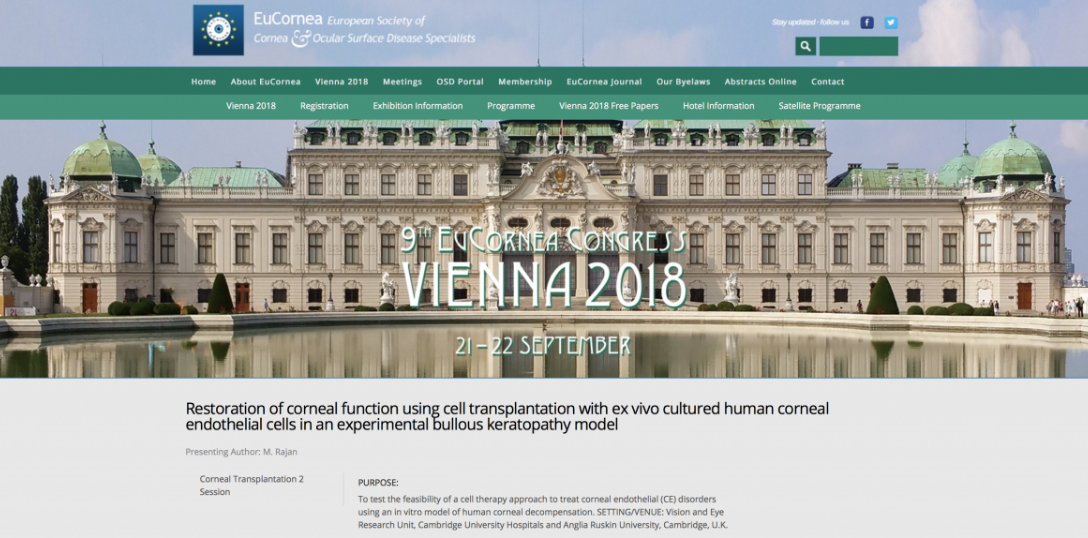
Loading...

Mr. Rajan was invited to give the 30th MCLOSA Kersley lecture on the 6th Dec 2024. Mr Rajan addressed the MCLOSA society and delivered the Kersley lecture in London that included delegates from optometry, contact lens practitioners, ophthalmologists and industry representatives.

The Corneal Research Team led by Madhavan Rajan at the Anglia Ruskin University and Cambridge University Hospital were awarded the Best Scientific Paper Award at the EuCORNEA International meeting held in Vienna on the 21 – 22 September 2018. Mr Rajan delivered the results of a novel treatment strategy to cure corneal blindness with the aid of cultured corneal endothelial cells in a controlled laboratory environment.
Best Cornea Research Paper Award’ was conferred to Professor Rajan’s research team for the presentation describing the encouraging clinical outcomes of ‘Microthin Corneal Endothelial Keratoplasty undertaken for patients with corneal blindness by the expert panel of judges at the UK and Ireland Cataract and Refractive Surgeons Society (UKISCRS) annual meeting held on 23rd Oct 2015.
During the recent visit to China as a consultant for the Lifeline Express program in October 2015, Professor Madhavan Rajan was appointed as visiting professor of Liaocheng School of Clinical Medicine, Taishan Medical University
The Cornea research team at VERU was awarded the ‘Best paper prize’ at the EUCORNEA meeting in Amsterdam on the 4th October 2013. The award was received by Dr Heidi Aichner, Corneal fellow who presented the results of the human corneal penetration and anterior chamber concentration of topical antifungal agents to the research and clinical audience. The prospective randomized trial was led by Professor Rajan based at VERU in conjunction with Cambridge Eye Unit, Addenbrooke’s Hospital and Microbiology Services Division, HPA South West Laboratory, Bristol. The project utilized the previously established In vitro human corneal model at VERU to show significant variations in bioavailability between various anti-fungal agents, thereby explaining the poor clinical response seen in certain types of mycotic keratitis. The judging panel of EUCORNEA meeting commended the research as having significant translational value and vital to the understanding of clinical responses to topical anti-fungals in resistant and often vision threatening fungal corneal infections. The corneal research team in Cambridge continues to make progress in corneal therapeutics to optimize management of such severe blinding infections.
Professor Rajan’s team received the first prize for Medical Technology Innovation by NHS Enterprise East in July 2011 for a novel medical device that would allow preparation of micro-thin corneal transplants to help faster visual rehabilitation in patients with corneal blindness. They have now completed investigations with the prototype device and with the help of our Cambridge University Hospitals Trust’s research and development team, a medical device company have entered into a contract to manufacture the device to make it available to corneal surgeons in the rest of Europe and the Americas. The new technique of ‘Microthin endothelial keratoplasty’ was presented at international ophthalmic conferences in Vienna (Sept 2011), UAE (Feb 2012) and Florida (May 2012) resulting in press releases and commendations. The research paper has been published in the Cornea Journal . In April 2013, we took delivery from the first commercial device termed CamFlow, a result of a useful collaboration with a medical device company in the UK (Network Medicals, Yorkshire).
Cambridge Vision Clinic based in Cambridge, UK features an excellent team of eye care professionals offering a personalised, safe approach to patients with cataract and eye disorders for over 10 years.
Email: info@cambridgevisionclinic.org
Phone: 07871660645
Fax: 01223 266 958